'Raised to argue': Robert F. Kennedy Jr. says his 2024 campaign is 'largely misunderstood'
It has been 55 years since a gunman fatally shot his father – a presidential candidate at the time ? but Robert F. Kennedy Jr. can still vividly remember details of the tragedy.
“We would slow to a crawl as we went through those stations, and we could hear them singing 'The Battle Hymn of the Republic,'” he said of the crowds lining the tracks and watching the train carrying his father’s body from New York City to Washington, D.C. Kennedy recalled the train ride speaking on SiriusXM radio host Michael Smerconish's program this month in the Philadelphia suburb of Norristown that coincided with the anniversary of his father’s assassination.
Kennedy, then 14, remembers watching nuns wave handkerchiefs and rosaries, women hold up babies and Little League players with their hands on their hearts during the nearly eight-hour train ride that usually takes closer to three.
An heir to the storied political family, Kennedy is now on his own political journey. Kennedy, 69, who bears the Kennedy family resemblance, though with a weathered face and raspy voice, is vying for the White House.
And just like his famous father, he is challenging an incumbent president of his own party.
In Norristown, Kennedy condemned the “toxic polarization that is really destroying our country.” Like his father in the 1960s, he lauds a similar crusade, but is instead campaigning on his belief that leaders in the Democratic Party today amplify division and push lies.
The junior Kennedy has his family's name but lacks his ancestors' popularity and is perceived differently in the public eye ?in part for pushing anti-vaccine views that are at odds with what government agencies and prominent public health experts say. More diseases, like measles, can occur in communities with pockets of unvaccinated people, according to the Centers for Disease Control and Prevention.
Kennedy sees himself as the only candidate who can return the Democratic Party back to the ideals of his relatives. But skeptics say his platform crosses the political spectrum, ranging from those of a “Kennedy Democrat” to issues that resonate more with the right.
Former President Donald Trump, the Republican front-runner, recently called Kennedy a "very smart guy and a good guy" on a radio show.
Trump allies are supporting him, including former Fox News host Tucker Carlson who dedicated an episode of his Twitter show to Kennedy. Steve Bannon, a former senior aide in Trump's White House, promoted Kennedy on his War Room podcast in April.
The candidate also has found favor and airtime with other celebrities. Joe Rogan, a talk show host who has been critical of the government's handling of the COVID-19 pandemic and vaccines, hosted Kennedy on his show to discuss vaccines. Rogan backed Sen. Bernie Sanders, I-Vt., in the 2020 presidential race and has supported Florida Gov. Ron DeSantis, a Republican candidate, so far this year.
Kennedy has had to defend many of his own claims, specifically around his views that vaccines are linked to autism. Vaccines do not cause autism, according to the CDC and the National Institutes of Health.
These views have led critics to question his stances ? such as comments Kennedy made in a video recently circulating on social media where he falsely claims AIDS is caused not by HIV but by a "gay lifestyle" and addiction to drugs historically used in the LGBTQ community.
But his candidacy resonates with some. A CNN poll May 25 found Kennedy polling at 20% in the Democratic field against President Joe Biden and self-help author Marianne Williamson.
Who is running for president in 2024? Take a closer look at every candidate so far
The Kennedy name
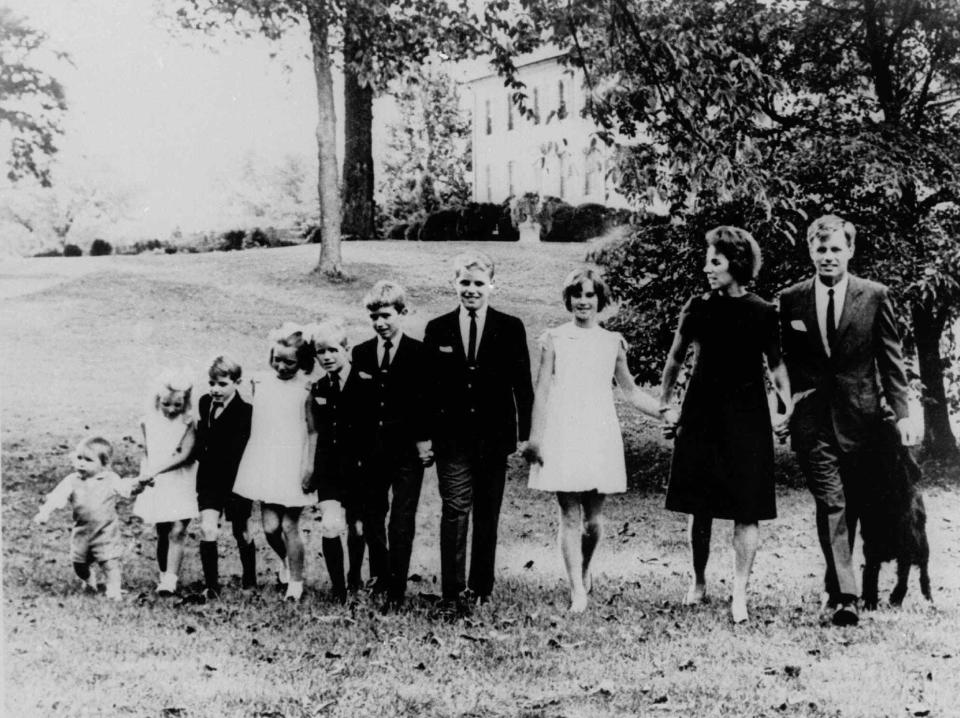
He is the fourth member of the family running for president with the Kennedy name.
The son of former U.S. Attorney General Robert F. Kennedy, who also served as a New York senator, and nephew of former President John F. Kennedy, both Democrats assassinated in the 1960s, the junior Kennedy told USA TODAY having the family name behind him will help him in the race.
But not all his family supports him. Several family members in 2019 wrote a POLITICO op-ed condemning Kennedy for spreading misinformation about vaccines. They wrote that Kennedy "spread dangerous misinformation" and " is complicit in sowing distrust of the science behind vaccines."
Others have publicly said that they will not vote for him in 2024.
But Kennedy said that despite the disagreements, he has a great relationship with his family.
“We were raised to argue and dispute each other at the dinner table every night. My grandfather did this with his children. My father and mother did it with us to get us to take positions and to argue our case,” he told USA TODAY in an interview in May.
A Harvard graduate, Kennedy worked at several environmental nonprofits, serving as an environmental lawyer at the Natural Resources Defense Council and as president of the Waterkeeper Alliance for more than 20 years. His advocacy focused on clean water, the environment, energy and human rights.
He later started his own nonprofit, the Children’s Health Defense, which he formed with vaccine safety advocates. The organization focuses on anti-vaccine messaging, claiming its mission is to “end childhood health epidemics by working aggressively to eliminate harmful exposures.”
During COVID-19, Kennedy criticized the government's handling of the pandemic and vaccines ? even losing his Instagram account when he was accused of spreading misinformation about the virus. He criticized the lockdowns, suggesting things were worse for Americans than they were for Anne Frank, the Jewish teenager who hid with her family during the Holocaust and died in a concentration camp.
Kennedy later apologized for the comments. It marked the second time he apologized for comparing Nazis and the Holocaust to public health measures. In 2015, he used the word "Holocaust" to describe children he believes were hurt by vaccines.
A campaign of controversy: 'Show me where I'm wrong'
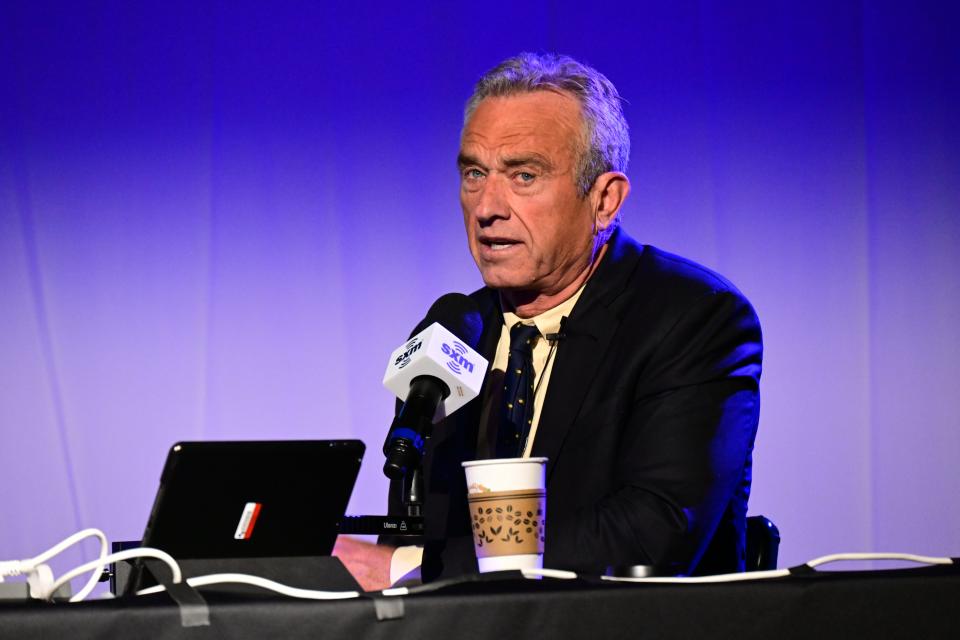
Kennedy defends his views on vaccines and his criticism for how the government handled the pandemic to those who say his views aren’t based on facts.
“It’s irrelevant,” he said in May. “There’s no Democratic version of the truth or Republican version of the truth. We should have evidence-based policy, and I think everybody ultimately would like to support that.”
He added in Norristown, “If you can show me a study that is a well-founded study that challenges my position, I'll just change my position."
For some voters, the evidence is not convincing.
After seeing Kennedy in Norristown, Julie Centafont felt that some of his positions "are a little bit out there for me."
"He needs to hone his message," said Centafont, who identifies as center-left on the political spectrum. "If he's going to make claims, he has to be clear in what the claims are and then support them."
A 'topsy turvy' party definition
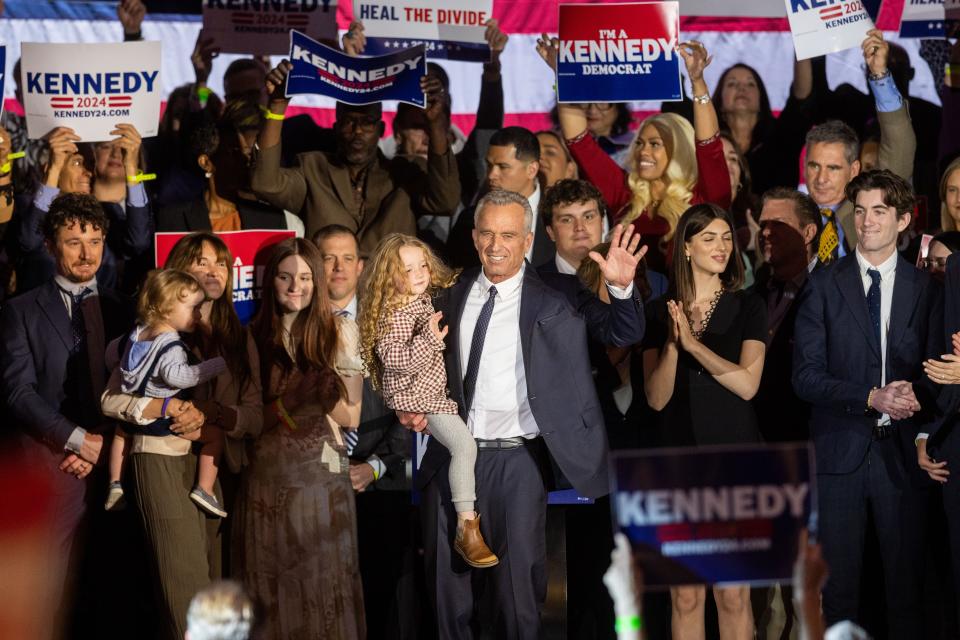
Kennedy struggles to label himself when asked where he falls on the political spectrum.
“I think the party definitions are so topsy-turvy right now, I wouldn’t know how to describe myself,” he told USA TODAY. “I would describe myself as a liberal Democrat, which means I’m for civil liberties, I’m against war, I’m against corporate domination, I’m against censorship.
“But I don’t know now ? those are kind of Republican issues now, strangely.”
On issues like gun control, Kennedy says he leans right and said in Norristown that he has no plans to take away anyone’s guns. On abortion, he feels the government should not be telling people what to do with their bodies and it should be up to the woman during the first three months of pregnancy.
“I feel like there is a hunger for a different direction," he told USA TODAY. "People do not like the direction our country is going, and they don’t particularly think that President Trump or President Biden are going to do a course correction."
A derailment of the Democratic Party
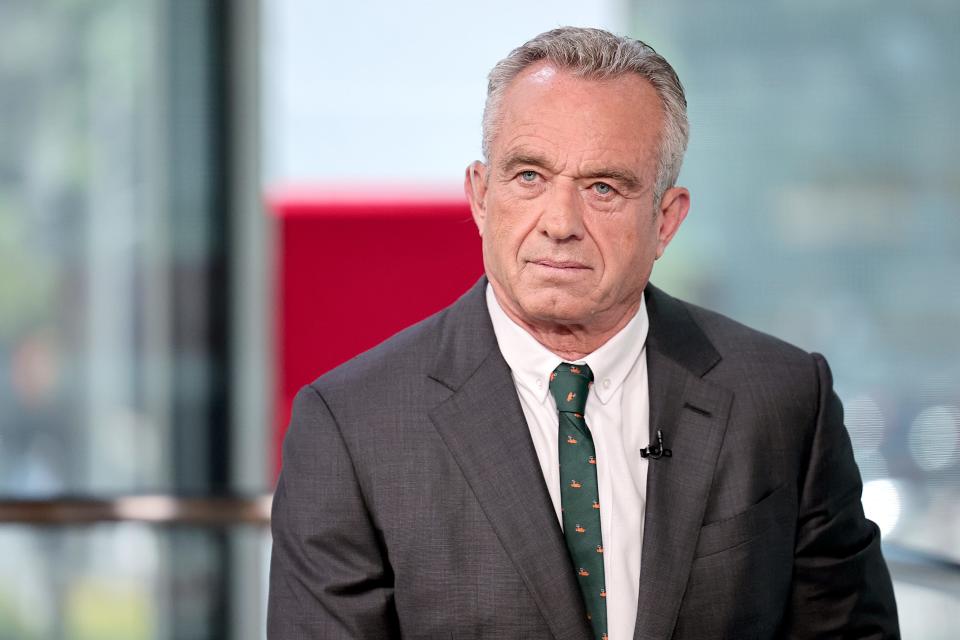
Kennedy told USA TODAY his motivation for the campaign stems from feeling the country is headed down the wrong path.
“My political party, the Democratic Party, seemed to just have derailed and was just a slow-motion train wreck,” he said.
He says the Democratic Party is departing from the values he witnessed growing up. Now, Kennedy says, Democrats are the party of censorship, war, Wall Street and "neocons" ? a word he uses to describe those who “believe the collapse of Soviet Union meant that the United States had to earn the ability to rule the world.”
The middle class has been abandoned by the Democratic Party, he said, and are now migrating to “demagogues like Donald Trump.”
He says his strategy to reboot the country is simple: Tell the truth.
“I think that’s where it all begins,” he said.
The messaging resonates with Bren Logan, a registered independent who lives in the greater Philadelphia area. She plans on never voting for a Democratic candidate again, unless Kennedy is the nominee.
"He's the only Democrat I will vote for probably for the rest of my life," she said, "unless he restores the Democratic Party to what it once was trying to be."
Logan said she felt “pure elation” when he launched his campaign.
"I don't think people are really being given a fair chance to hear who he truly is, what platforms he's truly running on ? to tell the truth and heal the divide and reinstitute common sense."
More: Robert F. Kennedy Jr. launches unlikely presidential bid backed by 14% of Biden voters
An effort to garner support
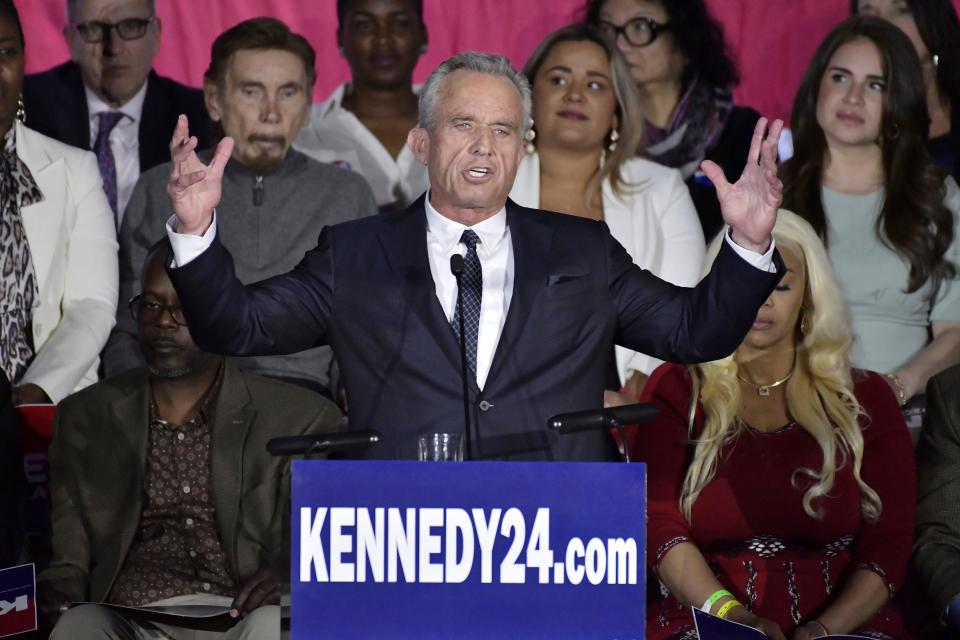
Kennedy has also garnered other big-name endorsers: Comedian Rob Schneider, NFL quarterback Aaron Rodgers, actress Alicia Silverstone, former Twitter CEO Jack Dorsey and the far-right InfoWars host Alex Jones.
The presidential candidate said part of his campaign strategy is to reach all supporters ? even those registered to the opposite party.
“I’ll talk to anybody who will talk to me,” he said. “The only people I’m not talking to are Steve Bannon and Alex Jones, and personally if it were up to me, I would talk to them, but my wife would probably leave me if I did that.”
Kennedy recently participated with Elon Musk in a Twitter Space, the same platform where DeSantis announced his presidential campaign. Kennedy praised alternative media platforms like Twitter Spaces for giving him a “vector for reaching Americans without going through the corporate media.”
"That's my only path to victory," he told USA TODAY.
The candidate spoke for more than two hours with guests including Musk and Tulsi Gabbard, a former Democratic House representative who left the party and registered as an Independent.
“Twitter was always kind of the last refuge for those of us who were trying to talk about issues that departed from the official orthodoxies and were being censored on the other platforms,” he said during the Twitter Space, calling Musk’s arrival at the social media company a “breath of fresh air for our country.”
He told USA TODAY that alternative media such as social media and podcasts provide him with the format to give detailed responses or two-hour speeches that aren’t 30-second TV sound bites.
“I think that podcasting is a good media for me because my weakest thing is these short media, five minutes on air, because it takes about five to 10 minutes for my voice to warm up,” he said. Kennedy has spasmodic dysphonia, a neurological disorder that affects his speech.
Sean Rad, who is the co-founder and former CEO of the dating app Tinder, is helping run Kennedy’s digital campaign using platforms like TikTok. Kennedy’s Instagram was reinstated in June.
A campaign 'largely misunderstood'
Kennedy claims his campaign is “largely misunderstood” in the media, with most coverage including misstatements about his beliefs or taking his words out of context.
“Listen to what I say rather than what people say that I said,” he advises voters. “Make up your mind based on what I said rather than a mischaracterization or somebody else’s characterization of what I said."
James Taulbee, a retired veteran and small-business owner from York County, Pennsylvania, does just that.
"I love that Bobby brings the receipts," he said. The 43-year-old sported a "Kennedy for president" T-shirt when seeing Kennedy in Norristown.
Jamal Heacock, an information technology manager who also heard Kennedy speak in Norristown, described the candidate as "an absolutely fascinating blend of passionate intelligence and crazy."
Having the Kennedy name has always been a leg up in the political sphere, but a mixed response from voters coupled with running against an incumbent president make the odds of winning the Democratic primary seem long.
“My only strategy is to tell the truth to the people,” Kennedy said. “If there’s an appetite for that, then I’ll be president in 2025.”
This article originally appeared on USA TODAY: Robert F. Kennedy Jr. campaign: He says he's 'largely misunderstood'
